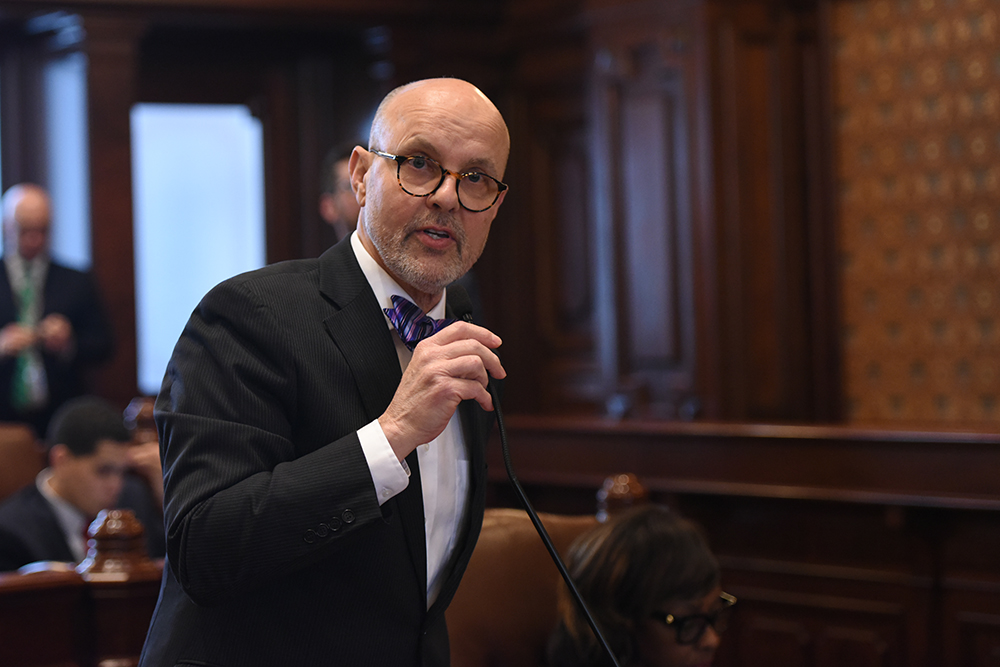- Details
- Category: Senator Mike Simmons News
 CHICAGO — Mike Simmons became the first openly gay member of the Illinois Senate, and the first person of color to serve as state Senator from Illinois’ 7th District after being sworn in Saturday.
CHICAGO — Mike Simmons became the first openly gay member of the Illinois Senate, and the first person of color to serve as state Senator from Illinois’ 7th District after being sworn in Saturday.
“This breaks down a ceiling that is important for the most diverse state Senate district in Illinois,” Simmons said. “And as our new state Senator, I will work tirelessly to amplify the voices and urgent needs of the most vulnerable residents of my district: Our immigrants, those struggling with access to housing, seniors, people in between jobs, single mothers, returning citizens, LGBTQIA+ people, young people, and so many others who have been hit hardest by the pandemic.”
Read more: Simmons sworn in as State Senator for 7th District
- Details
- Category: Senator Heather A. Steans News
 State Senator Heather Steans stepped down at the end of January from her 7th District seat following a career marked by major changes to the law in her 13 years in office. During that time, she was instrumental in legalizing the adult use of cannabis in Illinois, taking important strides to transforming the state’s hospital system, and negotiating the finer details of the state’s annual budget.
State Senator Heather Steans stepped down at the end of January from her 7th District seat following a career marked by major changes to the law in her 13 years in office. During that time, she was instrumental in legalizing the adult use of cannabis in Illinois, taking important strides to transforming the state’s hospital system, and negotiating the finer details of the state’s annual budget.
In recent years, Steans was an outspoken advocate on many issues. During the years-long budget impasse, she fought to preserve child care assistance funding, argued on behalf of those who need state aid for their struggles with addiction, and moved forward appropriations to help the state’s most vulnerable. She was a champion for direct support personnel and imposed stiffer fines on vandalism associated with hate crimes.
Read more: Steans leaves legacy of progressive victories as she retires from 7th Senate District
- Details
- Category: Senator Julie A. Morrison News
 HIGHWOOD – State Senator Julie Morrison (D-Buffalo Grove) is relieved those who are part of the state’s most vulnerable community can start getting vaccinated by the end of the month.
HIGHWOOD – State Senator Julie Morrison (D-Buffalo Grove) is relieved those who are part of the state’s most vulnerable community can start getting vaccinated by the end of the month.
“Many people who have disabilities or pre-existing conditions can be at higher risk of complications from COVID-19,” Morrison said. “We must take care of our most vulnerable people. Those in the developmentally disabled community are presented unique challenges that put their lives in danger each day.”
- Details
- Category: Senator Patrick Joyce News
 BRADLEY – A new 6,000-square-foot facility serving Commercial Driver’s License holders will open in Bradley on Tuesday, Feb. 23, State Senator Patrick Joyce (D-Essex) announced.
BRADLEY – A new 6,000-square-foot facility serving Commercial Driver’s License holders will open in Bradley on Tuesday, Feb. 23, State Senator Patrick Joyce (D-Essex) announced.
“We have depended on transportation companies and truck drivers throughout the COVID-19 pandemic to keep the supply chain running,” Joyce said. “This new location will maximize the facility’s traffic flow and efficiency to keep this essential industry operating smoothly.”
- Details
- Category: Senator Karina Villa News
 WEST CHICAGO – To combat the spread of COVID-19 in vulnerable communities, State Senator Karina Villa (D-West Chicago) announced over 2,000 West Chicago residents and employees will get vaccinated this Friday, Feb. 12. This achievement is a collaborative community effort with State Representative Maura Hirschauer (D-Batavia), the West Chicago Jewel Osco, Superintendents Moses Cheng and Kristina Davis-Salazar, and other local elected officials.
WEST CHICAGO – To combat the spread of COVID-19 in vulnerable communities, State Senator Karina Villa (D-West Chicago) announced over 2,000 West Chicago residents and employees will get vaccinated this Friday, Feb. 12. This achievement is a collaborative community effort with State Representative Maura Hirschauer (D-Batavia), the West Chicago Jewel Osco, Superintendents Moses Cheng and Kristina Davis-Salazar, and other local elected officials.
“The vaccine is our best defense against the spread of COVID-19, and every Illinois resident must have to that protection,” Villa said. “With such a short expiration date on the vaccine, we have to think fast to make sure not a single dose is wasted.”
Read more: Villa secures 2,000 vaccine doses for vulnerable residents
- Details
- Category: Senator Scott Bennett News
 CHAMPAIGN – In search of answers for out-of-work residents in central Illinois and across the state, State Senator Scott Bennett (D-Champaign) will question representatives from the Illinois Department of Employment Security regarding unemployment insurance issues during the pandemic at the Senate Labor Committee’s subject matter hearing Wednesday, Feb. 10 at 10 a.m.
CHAMPAIGN – In search of answers for out-of-work residents in central Illinois and across the state, State Senator Scott Bennett (D-Champaign) will question representatives from the Illinois Department of Employment Security regarding unemployment insurance issues during the pandemic at the Senate Labor Committee’s subject matter hearing Wednesday, Feb. 10 at 10 a.m.
The unprecedented flood of claims in the last year, when more than 1 million Illinoisans lost their jobs, overwhelmed the department.
Read more: Bennett calls for answers during committee hearing on IDES problems
- Details
- Category: Senator Jacqueline Y. Collins News
 State Senators Jacqueline Collins and Robert Peters joined several nonprofit groups and Illinois AARP at a press conference today highlighting the results of a recent study showing vast disparities in access to health care and other services which are leaving elders in communities of color worse off.
State Senators Jacqueline Collins and Robert Peters joined several nonprofit groups and Illinois AARP at a press conference today highlighting the results of a recent study showing vast disparities in access to health care and other services which are leaving elders in communities of color worse off.
"It is critical that we address the longstanding inequities that exist in older communities of color across our state. As a senator and member of the Illinois Legislative Black Caucus, I have long championed policy solutions to end the inequities faced by our older Illinoisans of color, and continue to do so today through a robust social justice agenda spearheaded by the Illinois Legislative Black Caucus," said Collins (D-Chicago). "With the onset of the COVID-19 pandemic and the devastating effects of the pandemic on older adults in particular, the need to focus on these older communities of color is paramount."
- Details
- Category: Senator Dave Koehler News
 PEORIA – State Senator Dave Koehler will participate in a subject matter hearing of the Senate Labor Committee this week to learn about the status of several unemployment insurance issues plaguing the Illinois Department of Employment Security over the last year. The unprecedented flood of claims during the COVID-19 crisis, when more than 1 million Illinoisans lost their jobs, overwhelmed the department.
PEORIA – State Senator Dave Koehler will participate in a subject matter hearing of the Senate Labor Committee this week to learn about the status of several unemployment insurance issues plaguing the Illinois Department of Employment Security over the last year. The unprecedented flood of claims during the COVID-19 crisis, when more than 1 million Illinoisans lost their jobs, overwhelmed the department.
“Issues with our unemployment benefits system have plagued the Department of Employment Security since the early days of the COVID-19 pandemic,” Koehler said. “It is not the goal of the committee to publicly scold the department or its employees, who have been working around the clock for those in dire need. But at some point we need concrete answers regarding what is being done to fix our broken system. It is my hope that this committee hearing will serve as a progress report on those issues from the department’s representatives.”
Read more: Koehler to seek answers during Senate Labor Committee hearing on status of IDES issues
More Articles …
Page 561 of 765



















 © 2026 Illinois Senate Democratic Caucus
© 2026 Illinois Senate Democratic Caucus